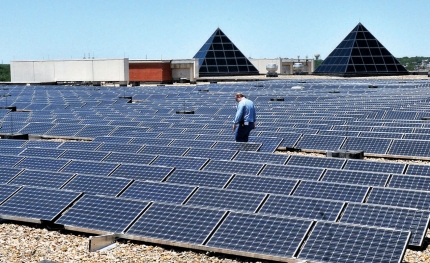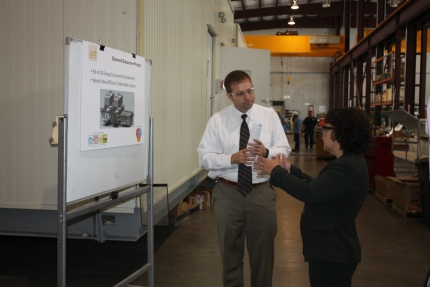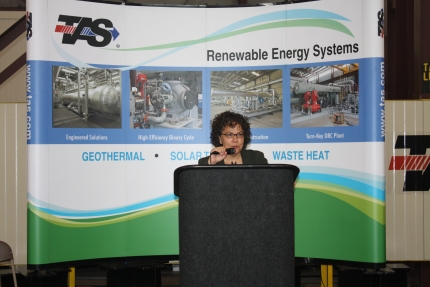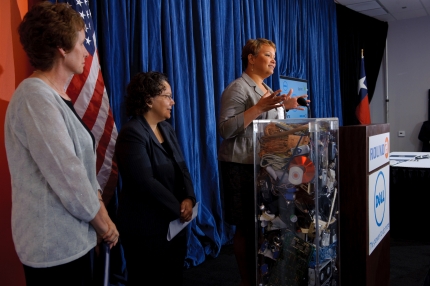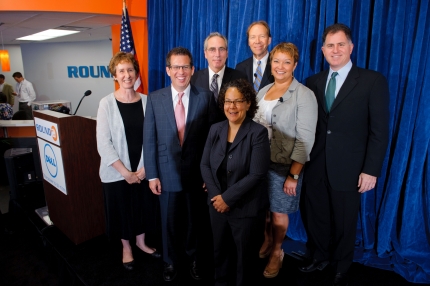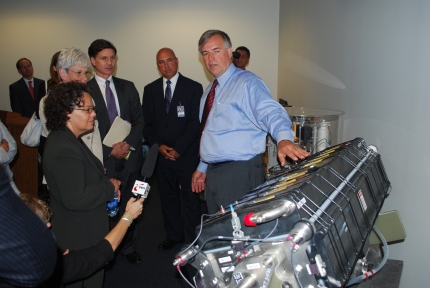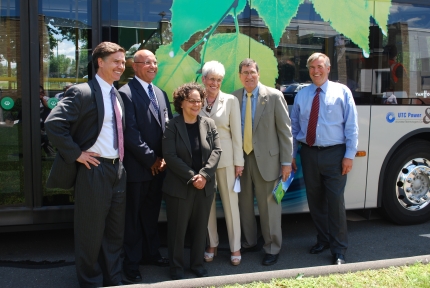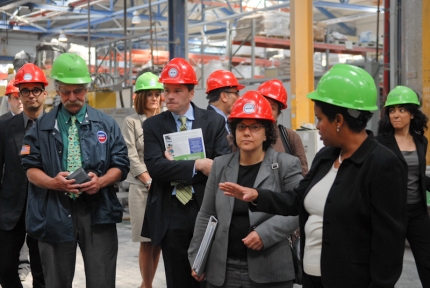Council on Environmental Quality Blog
Fastest Growing Industry in the U.S. – Solar Energy
Posted by on July 27, 2011 at 1:37 PM ESTThe U.S. solar energy industry is booming.
In June, the Solar Energy Industries Association and GTM Research released the U.S. Solar Market Insight: 1st Quarter 2011 report showing that in the last three years the U.S. solar industry has gone from a start-up to a major industry that is creating well-paying jobs and growing the economy in all 50 states.
Solar's robust growth in the past years has been the result of a very favorable combination of new, innovative business models, affordability for consumers, rapidly decreasing manufacturing costs, and most importantly, a strong commitment from the Obama Administration and other policymakers in Washington.In the first quarter of 2011, the solar industry installed 252 megawatts of new solar electric capacity, a 66 percent growth from the same time frame in 2010. There are now almost 3,000 megawatts of solar electric energy installed in the U.S., enough to power 600,000 homes. In the manufacturing sector, solar panel production jumped 31 percent.
And with the growth of the solar industry, thousands of jobs have been created. In fact, solar energy creates more jobs per megawatt than any other energy source. According to the Solar Foundation’s National Solar Jobs Census, 93,000 Americans were employed in the U.S. solar industry in 2010 and that number is expected to grow between 25-50,000 this year.
The Obama Administration has taken solar energy initiatives to unprecedented levels and is leading the effort to win our clean energy future. In addition to creating American jobs, President Obama has put words to action through his call for the government to lead by example:
- Just today, The Department of Veterans Affairs (VA) announced that it will install solar photovoltaic systems by summer 2012 at five VA medical centers in Oklahoma City; Temple, Texas; Amarillo, Texas; Loma Linda, Calif. and West Los Angeles. Prior to this announcement the VA has also awarded nearly $78 million in contracts to build solar panels at its facilities with a goal to derive 15 percent of its annual electricity usage from renewable sources by 2013.
- The Department of Energy has issued loan guarantees for solar power projects and manufacturing facilities that will create more than 26,000 jobs.
- The Department of the Interior has approved permits for solar power projects on public lands that will provide enough power for over 730,000 homes.
- The Department of Agriculture actively promotes the deployment of solar energy on farms and ranches throughout the country. The American Recovery and Reinvestment Act of 2009 extended benefits to farmers and ranchers who utilize solar systems.
And the list goes on.
The U.S. market is expected to more than double yet again in 2011, installing enough solar for more than 400,000 homes. Last year, the industry set the ambitious yet achievable goal of installing 10 gigawatts annually by 2015 – enough to power 2 million more homes each and every year. Combining continued leadership from the Administration with industry innovation that drives down cost, that goal is now within reach.
Rhone Resch is President and CEO of the Solar Energy Industries Association
Learn more about Energy and EnvironmentVoice of an Innovator: We're Hiring!
Posted by on July 26, 2011 at 2:57 PM ESTEditor's Note: This post introduces readers to Tom L. Pierson, Founder of TAS Energy Inc., a renewable energy and energy efficiency technology manufacturing plant based in Houston, Texas.
A few weeks ago we were very pleased to welcome CEQ Chair Nancy Sutley and our Congresswoman, Sheila Jackson Lee, to TAS Energy to discuss and showcase how U.S. entrepreneurs are creating innovative ways to improve our energy infrastructure— directly resulting in significant domestic job growth. In fact, at TAS Energy we have almost 50 job openings!
We focused our discussion on American job creation opportunities from the modular, or exportable, approach to capitalize on the 'low hanging fruit' of economic clean energy—including emission free baseload power from industrial waste heat, modular cooling for building air conditioning and data centers (that is twice the efficiency of traditional systems), and a cooling technology for gas power plants to dramatically and cost effectively increase capacity.
These examples of the 'low hanging fruit' of economic clean energy have a unique advantage in leading the world in clean energy and American job creation, for both manufacturing and aftermarket services. The modular approach to manufacturing these energy systems for global export will result in a revolutionized clean energy economy for domestic job growth, significant energy conservation and an abundance of clean generation.
Our Country's leadership under President Obama is right on the mark when they say that American innovation is one of the keys to our economic recovery and future success. The TAS team and its many suppliers appreciated the opportunity to demonstrate for Chair Sutley and Congresswoman Jackson Lee how American innovation is creating jobs TODAY with tremendous opportunity for future American job growth with smart policy adoption. We look forward to helping the American economy grow through American job creation in the clean energy field.
Tom L. Pierson is Founder of TAS Energy Inc.
Learn more about Energy and EnvironmentLeading By Example Toward the Jobs of the Future
Posted by on July 21, 2011 at 5:07 PM ESTYesterday in Austin, Texas, U.S. Environmental Protection Agency Administrator Lisa P. Jackson, General Services Administrator Martha N. Johnson, and White House Council on Environmental Quality Chair Nancy Sutley joined the CEOs of Dell Inc. and Sprint, and a senior executive from Sony Electronics to release the Obama Administration’s "National Strategy for Electronics Stewardship" – a framework for responsible electronic design, purchasing, management and recycling that will promote the burgeoning electronics recycling market and jobs of the future here at home. The announcement, made at Round2 Recycling Facility, included the first voluntary commitments made by Dell, Sprint and Sony with EPA aimed at promoting environmentally sound management of used electronics. The Administration's strategy also commits the Federal Government to take specific actions that will encourage more environmentally friendly design of electronic products, promote recycling of used or discarded electronics, and advance a domestic market for electronics recycling that will protect public health and create jobs.
The response has been quite positive. See some statements of support below from various business leaders, advocacy groups and Members of Congress:
John Shegerian, Co-Founder, Chairman and CEO, Electronic Recyclers International, Inc. (ERI)
"ERI is encouraged to see that the Federal government is leading the way by establishing a policy to utilize only certified recyclers for its electronics processing, increase U.S. jobs, and reduce harm from U.S. exports of e-waste. As an R2 and e-Stewards certified company, ERI supports the safe handling of recycling electronics here in the U.S. and abroad and looks forward to working with the Federal government in promoting scientific and technological developments to improve the electronics recycling process and maximize the recovery of valuable materials from discarded electronics."Willie Cade, CEO, PC Rebuilders & Recyclers, LLC.
"The release yesterday of the 'National Strategy for Electronics Stewardship' by the Obama Administration is a meaningful and positive step forward in solving the e-Waste problem. The strategy clearly shows that the Administration spent considerable time and effort listening, digesting and planning. This will prove to be a very successful jobs creation and sustainability or 'Green' program…This is the first comprehensive sustainability strategy in our nation's history."Walter Alcorn, Consumer Electronics Association (CEA) Vice President of Environmental Affairs and Industry Sustainability
"Electronics recycling is a national problem that deserves a national solution. Today's announcement from EPA, GSA and CEQ echoes the principles our industry laid out this spring with the eCycling Leadership Initiative. We look forward to continuing our dialogue with EPA, GSA and CEQ in the hopes of fortifying a robust public-private partnership that ensures consumers across our nation have ample opportunities to recycle electronics responsibly. A formidable partnership is the best way to develop a national approach to eCycling that replaces the patchwork of costly and confusing state regulations."Robin Wiener, President, The Institute of Scrap Recycling Industries, Inc. (ISRI)
"Our federal government is the largest source of used and end-of-life electronics. It is encouraging to see that the government is taking a strong position on the responsible management of these materials. Even more, we are encouraged by the Obama Administration's flat dismissal of burdensome and overreaching legislation that would ban exports and pull the rug out from under an industry that continues to create jobs and contribute to both the U.S. and global economy. Today's announcement includes practical, effective steps that actually address bad actors instead of shutting down an industry."Don-Michael Bradford, PhD, CE, President and CEO, Pacific Federal Energy Systems
"Your very important written policy framework will enable companies such as ours [which recycles e-waste] to show the investment community that the government is serious about providing a value-added solution to the growing eWaste problem in the US."Dr. Allen Hershkowitz, Solid Waste Project Director, Natural Resources Defense Council
"The export of unprocessed electronic wastes from the United States to the developing world must end because electronic wastes contain many toxic substances. Indeed, exporting of unprocessed electronic wastes is the number one environmental problem plaguing e-waste management in the United States. The Interagency Task Force on Electronics Stewardship report has recognized this as a global problem and the good news is that recycling e-waste domestically creates new jobs and stimulates wider economic development more generally. Consequently, what all municipalities, businesses, and all generators of e waste must take away from today's Task Force report is that used electronic wastes must be recycled domestically for both economic and public health reasons. However, the single largest generator of electronic wastes in the United States is the federal government itself, and it must lead by example and assure that all of its e-waste is recycled domestically as well."Congressmen Mike Thompson (D-CA) and Gene Green (D-TX)
"We are pleased that the Obama Administration is committed to addressing the growing issue of electronics waste, which now represents the fastest growing waste stream in the United States. Furthermore, we applaud the President for working not only with government agencies, but also the private sector to identify potential challenges and solutions to our e-waste problem. Private industry's perspective will be invaluable as we continue to develop workable and responsible e-waste policies."Sen. Tom Carper (D-Del.), Co-Chair of the Senate Recycling Caucus and Chair of the Subcommittee on Federal Financial Management
"As the largest purchaser of consumer goods in our country, the Federal government has an opportunity and a responsibility to ensure that it procures electronics in the safest, smartest way possible. The Obama Administration's announcement today of a 'National Strategy for Electronics Stewardship' leverages the purchasing power of the Federal government to support responsible purchasing, management and recycling of electronics within the Federal government. Through this initiative, the Federal government will work to promote the development of more efficient and sustainable electronic products; direct Federal agencies to buy, use, reuse and recycle their electronics responsibly; support recycling options and systems for American consumers; and, strengthen America's role in the international electronics stewardship arena. As Co-Chair of the Senate Recycling Caucus and as Chair of the Subcommittee on Federal Financial Management, I warmly welcome the Administration's move to bolster electronics recycling and believe it will help not only our environment but also our economy along the way."Sahar Wali is the Director of Communications at the White House Council on Environmental Quality
Learn more about Energy and EnvironmentGreenGov: Getting Results
Posted by on July 21, 2011 at 10:29 AM ESTSince President Obama signed Executive Order 13514 and kicked off the GreenGov Challenge, the Federal community has been working to demonstrate what leadership by example means in projects around the country.
From Sandia National Laboratory's solar powered vehicles to NASA's Sustainability Base, these GreenGov success stories are showing that focusing on beneficial energy and environmental outcomes leads to good economic results – consistent with estimates that meeting President Obama's sustainability goals would save taxpayers up to $11 billion in energy costs over the next decade.
It's no surprise that projects that are focused on reducing energy and water use and eliminating waste would cut costs, too. Leading American companies report similar results, and their best practices – shared at educational events like the GreenGov Symposium – have helped to inspire and inform Federal efforts.
With nearly 500,000 buildings, more than 600,000 vehicles, and $500 billion in annual purchasing power, the Federal Government has a responsibility to operate efficiently and intentionally when it comes to leveraging our market scale to foster a clean energy economy. These initial success stories show how Federal agencies are making good on that promise.
Michelle Moore is the Federal Environmental Executive at the White House Council on Environmental Quality
Learn more about Energy and EnvironmentAmerica's Modern Moon Shot
Posted by on July 15, 2011 at 4:57 PM ESTAs countries around the world race to seize the economic opportunities of clean energy, we have the chance to harness the incredible ingenuity and entrepreneurship of Americans to capture the advantage – and the jobs of the future – for the U.S.A. President Obama has compared this to our moon shot moment – the moment we decided that through determination and innovation, we would come from behind and win the race to be the first country in the world to put someone on the moon.
On Thursday, I got a chance to visit a company that is part of both yesterday's moon shot and today's. UTC Power in South Windsor, Connecticut, supplied clean energy to the 1969 Apollo space mission that first took Americans to the moon. Today, the company is using its fuel cell technology to deliver clean, highly efficient power to transit systems, schools, hospitals, supermarkets and corporations around the world. UTC Power's innovation has created more than 450 American jobs. They are just one example of how the global appetite for clean energy is presenting opportunities for our businesses, for good jobs that pay good wages, and for greater economic security for American families. The jobs of the future are in smart, sustainable, and modern clean energy technologies. Along with America's innovators, workers and entrepreneurs, we will make sure those jobs and those industries will be right here in the U.S.A.
Nancy Sutley is Chair of the White House Council on Environmental Quality
Learn more about Energy and EnvironmentVoice of an Innovator: The Comeback of American Manufacturing
Posted by on June 27, 2011 at 6:00 PM ESTEditor's Note: This blog introduces readers to Michelle Gibson, CEO of IceStone, a small green manufacturer based in Brooklyn, NY. Click here to read about CEQ Chair Nancy Sutley's discussion with leaders from IceStone and other green manufacturers on how the Obama Administration is supporting innovation and job growth in the manufacturing sector.
In his 2011 state of the union address, President Obama called on Americans to "out-innovate, out-educate, and out-build the rest of the world." After more than 20 years overseeing the supply chain and operations of multi-national corporations, I witnessed firsthand the opportunity for businesses to shift from production that follows a "cradle to grave" value stream, to one that prioritizes renewable materials, clean energy, and the well-being of workers and customers. IceStone is one company striving to do just that, proving that an American manufacturing renaissance is possible. Since 2003, IceStone has been producing premium durable surfaces made of recycled glass and concrete. The production of our surfaces has diverted millions of tons of glass from the waste stream, and has created green collar jobs in the manufacturing sector that pay a living wage. IceStone is proof that it's possible to create good U.S. jobs; all it takes is capital, job training, and a sustainable business model.
To remain competitive in the global economy, incentive programs and policies must be designed to support the small businesses and start-ups that are driving smart innovation in our country. IceStone has been the beneficiary of state and federal support, securing the capital needed to purchase equipment, train workers, and invest in research and development. Furthermore, IceStone’s renovated 19th century factory is located inside the Brooklyn Navy Yard, a city-owned industrial park expected to add 2,000 new jobs in the next two years. The Navy Yard recently received the promise of a $15 million commitment from the New York State Senate allocated for increasing the number of green businesses there. Such resources are essential to incubate and fuel the types of businesses President Obama believes will "lead the comeback of American manufacturing."
In addition to capital, our workforces need the education, training, and benefits necessary to meet the demands of a new economic climate. Business and government must work together to provide not only green manufacturing jobs, but the requisite skills to perform those jobs. Furthermore, businesses must recognize that if we put the welfare of workers first, U.S. manufacturing will flourish. Providing safe, living-wage jobs for all our employees has always been part of IceStone’s mission, and we have trained members of our operations team to be stronger managers on the factory floor and to proactively create their own development plans.
Peter Strugatz and Miranda Magagnini co-founded IceStone with hopes of re-defining conventional business philosophy. I left the corporate world to join IceStone because I shared that vision, and understood the clear need for the triple bottom line. This new business model will be the most important trait of America's manufacturing renaissance. When I reflect on the culture we’ve created at IceStone, the outreach we’ve done in our local community, the waste we’ve reduced and up-cycled, the facility renovations that improve the energy efficiency of our operations, and the people IceStone has touched, I believe what the President said in his address to be true: "In America, innovation doesn’t just change our lives. It is how we make our living."
Michelle Gibson is CEO of IceStone.
Learn more about Energy and Environment
- &lsaquo previous
- …
- 23
- 24
- 25
- 26
- 27
- 28
- 29
- 30
- 31
- …
- next &rsaquo
White House Blogs
- The White House Blog
- Middle Class Task Force
- Council of Economic Advisers
- Council on Environmental Quality
- Council on Women and Girls
- Office of Intergovernmental Affairs
- Office of Management and Budget
- Office of Public Engagement
- Office of Science & Tech Policy
- Office of Urban Affairs
- Open Government
- Faith and Neighborhood Partnerships
- Social Innovation and Civic Participation
- US Trade Representative
- Office National Drug Control Policy
categories
- AIDS Policy
- Alaska
- Blueprint for an America Built to Last
- Budget
- Civil Rights
- Defense
- Disabilities
- Economy
- Education
- Energy and Environment
- Equal Pay
- Ethics
- Faith Based
- Fiscal Responsibility
- Foreign Policy
- Grab Bag
- Health Care
- Homeland Security
- Immigration
- Innovation Fellows
- Inside the White House
- Middle Class Security
- Open Government
- Poverty
- Rural
- Seniors and Social Security
- Service
- Social Innovation
- State of the Union
- Taxes
- Technology
- Urban Policy
- Veterans
- Violence Prevention
- White House Internships
- Women
- Working Families
- Additional Issues

